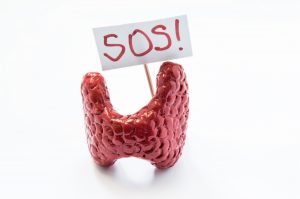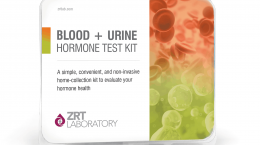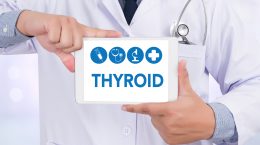Published on February 17, 2025
Are you stuck in a cycle of trial and error trying to get rid of these symptoms? Find out if the underlying cause is thyroid disfunction!
Key Points
- Symptoms arising due to a dysfunctional thyroid can include weight gain or inability to lose weight even with exercise and diet, heat or cold intolerance, low energy and stamina (unrelieved by sleep), irregular bowel habits – constipation/loose stools, hair loss, insomnia, menstrual irregularities, low sex drive, infertility, memory lapses or slow/fuzzy thinking, and more
- Specific nutrients are required for thyroid function, hormone production, and overall thyroid health, including vitamins A and C, zinc, B vitamins, iodine, iron, selenium, and others
- Several studies have found a direct effect of vitamin D supplementation on thyroid function, as well as significant associations between vitamin D levels and the levels of thyroid hormones and thyroid antibodies; for this reason, GrassrootsHealth has decided to introduce the Comprehensive Thyroid Panel with Vitamin D to further expand our research into vitamin D and thyroid health
 Do you have any of the following symptoms?
Do you have any of the following symptoms?
Testing the thyroid hormones with certain toxic and essential elements helps get to the root of the following symptoms related to thyroid dysfunction, exposure to toxins, and a lack of specific nutrients.
What Symptoms Are Associated with Thyroid Problems?
o Weight gain or inability to lose weight even with exercise and diet
o Feeling cold all the time when others don’t
o Low energy and stamina (unrelieved by sleep)
o Irregular bowel habits – constipation/loose stools
o Dry, thinning, or itchy skin
o Hair loss
o Insomnia
o Water retention
o Menstrual irregularities
o Low sex drive
o Infertility
o Memory lapses or slow/fuzzy thinking
o Dry/brittle hair and nails
o Depression
o Osteoporosis
o Weight loss
o Muscle and joint aches and pains
o High blood pressure
o Increased cholesterol levels
o Heat or cold intolerance
GrassrootsHealth has been offering testing of thyroid stimulating hormone (TSH) for several years as part of the D*action project. While TSH is a good marker for initially assessing thyroid function, measuring it alone does not offer enough insight into complete thyroid health or existing imbalances, and additional thyroid markers should be considered to make a proper diagnosis in the case of thyroid disfunction.
Vitamin D has also proven to be of particular importance to thyroid health. For this reason, GrassrootsHealth has decided to introduce the Comprehensive Thyroid Panel with Vitamin D to further expand our research into vitamin D and thyroid health!
Note: This is a ZRT Laboratories branded test kit offered through GrassrootsHealth. Results will not be posted to the myResults section of your daction.grassrootshealth.net participant account (with the exception of vitamin D). The full set of results will be reported to you as a PDF and will be stored securely in the GrassrootsHealth database for research purposes.
Nutrients Needed for Healthy Thyroid Hormone Production
As reviewed here, other specific nutrients are required for thyroid function, hormone production, and overall thyroid health. Examples are found in the following steps.
1. The brain signals thyroid to make thyroid hormone by producing TSH (thyroid stimulating hormone)
- TSH increases when thyroid hormones are decreased (telling the thyroid to make more)
- TSH decreases when thyroid hormones are increased (telling the thyroid to make less)
- Nutrients needed for this step include vitamin A, zinc, B vitamins, and protein
2. The thyroid makes the thyroid hormone T4
- T4 generation needs sufficient amounts of iodine, tyrosine, iron, B6, B2, B3, vitamin C, and vitamin D; Dr. Marchegiani suggests a vitamin D level between 70-100 ng/ml (175-250 nmol/L)
- Note: it is very important to get enough selenium when supplementing with iodine
3. Thyroid hormone T4 is then converted to T3
- Approximately 20% of T4 is converted to T3 at the thyroid; the other 80% is converted peripherally with the majority at the liver and the rest in the gut and adrenals
- Conversion requires selenium and zinc, and needs healthy liver function (which can be hindered by high toxins, not enough antioxidants, and low selenium), as well as healthy gut function and bacteria
- Healthy cortisol levels are also needed to maintain healthy thyroid hormone levels. In fact, high stress can increase reverse T3, which is inactive and blocks the actions of T3.
Several studies have also found a direct effect of vitamin D supplementation on thyroid function, as well as significant associations between vitamin D levels and the levels of thyroid hormones and thyroid antibodies. We will review these studies in an upcoming post.
Find Out if Your Thyroid Needs Help!
Expectations Regarding Testing and Results
This is a ZRT Laboratory branded test kit being offered through GrassrootsHealth. Samples will be sent directly back to ZRT Laboratory and results will be reported back to the GrassrootsHealth ordering provider. Results will NOT be posted to the myResults section of your daction.grassrootshealth.net participant account (with the exception of vitamin D). Your full set of results will be reported to you as a PDF and will be stored securely in the GrassrootsHealth database for research purposes.






